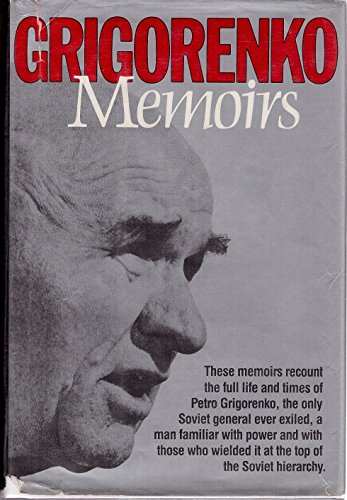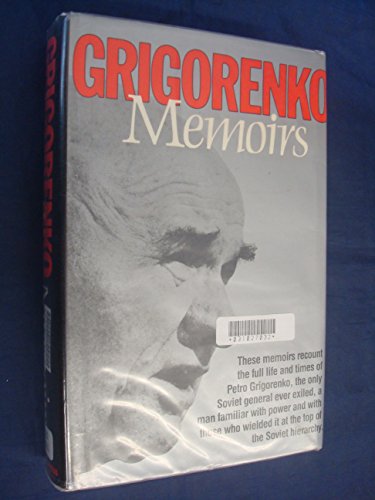GRIGORENKO, PETRO G TRANSLATED BY THOMAS P WHITNEY (3 Ergebnisse)
Produktart
- Alle Produktarten
- Bücher (3)
- Magazine & Zeitschriften
- Comics
- Noten
- Kunst, Grafik & Poster
- Fotografien
- Karten
-
Manuskripte &
Papierantiquitäten
Zustand
- Alle
- Neu
- Antiquarisch/Gebraucht
Einband
- alle Einbände
- Hardcover
- Softcover
Weitere Eigenschaften
- Erstausgabe (2)
- Signiert
- Schutzumschlag (2)
- Angebotsfoto
- Kein Print-on-Demand
Land des Verkäufers
Verkäuferbewertung
-
Memoirs
Verlag: W. W. Norton, 1982
ISBN 10: 039301570XISBN 13: 9780393015706
Anbieter: Willis Monie-Books, ABAA, Cooperstown, NY, USA
Buch Erstausgabe
Hardcover. Zustand: Very Good. Zustand des Schutzumschlags: Very Good-. 1st US Printing. Dustjacket has light edge wear and is in a mylar protector.
-
Memoirs
Verlag: W. W. Norton & Company, New York, 1983
ISBN 10: 039301570XISBN 13: 9780393015706
Anbieter: Ground Zero Books, Ltd., Silver Spring, MD, USA
Buch Erstausgabe
Hardcover. Sewn binding. Paper over boards. x, 462 pages. Map. Illustrations. Index. From Wikipedia: "Petro Grigorenko (October 16, 1907 February 21, 1987) was a high-ranked Soviet Army commander of Ukrainian descent, one of the founders of the human rights movement in the Soviet Union, dissident and writer. Petro Grigorenko was born in Borysivka village in Taurida Governorate, Russian Empire (in present-day Zaporizhia Oblast, Ukraine). He went on a military career and reached high ranks during World War II. After the war, being a decorated veteran, he left active career and taught at the Frunze Military Academy, reaching the rank of a Major General. In 1949, Grigorenko defended his Ph.D. thesis on the theme Features of the organization and conduct of combined offensive battle in the mountains. In 1960, he completed the work on his doctoral thesis. In 1961 Grigorenko criticized Nikita Khrushchev's policies and was transferred to Russian Far East as punishment. In 1963 he created the Union of Struggle for the Restoration of Leninism. In the 1970s Grigorenko became a member of the Moscow Helsinki Watch Group. The authorities sent him to a psychiatric imprisonment psikhushka from 1964 1965, and he was stripped of his military rank, medals, and retirement benefits. After his release, Grigorenko actively participated in the struggle for the Crimean Tatar autonomy. He also demonstrated against the 1968 Soviet invasion of Czechoslovakia and became a leading figure in Soviet human rights movement along with his fellow celebrated dissidents Vladimir Bukovsky, Andrei Sakharov, Alexander Yesenin-Volpin and others. He was arrested on May 7, 1969 and incarcerated for five years. Colonel-Doctor Lunts diagnosed his activities as evidence of paranoid schizophrenia and arranged to have him sent to the Chernyakhovsk prison hospital. On January 17, 1971 Grigorenko was asked whether he had changed his convictions and replied that "Convictions are not like gloves, one cannot easily change them". In 1971, Dr. Semyon Gluzman wrote a psychiatric report on Grigorenko. Gluzman came to the conclusion that Grigorenko was mentally sane and had been taken to mental hospitals for political reasons. In the late 1970s and early 1980s, Gluzman was forced to serve seven years in labor camp and three years in Siberian exile for refusing to diagnose Grigorenko as having the mental illness. Grigorenko was one of the first who questioned the official Soviet version of World War II history. He pointed out that just prior to the German attack on June 22, 1941, vast Soviet troops were concentrated in the area west of Bia ystok, deep in occupied Poland, getting ready for a surprise offensive, which made them vulnerable to be encircled in case of surprise German attack. His ideas were later advanced by Viktor Suvorov. In 1977, when Grigorenko left for medical treatment in the United States, he was stripped of his Soviet citizenship. Being in USA since 1977, Petro Hryhorenko took an active part in the activities of the Ukrainian Helsinki Group foreign affiliate. In 1979 in New York, Grigorenko was examined by the team of psychologists and psychiatrists including Alan A. Stone, the then President of American Psychiatric Association. The team came to the conclusion that they could find no evidence of mental disease in Grigorenko and his history consistent with mental disease in the past. The conclusion was drawn up by Walter Reich. In 1981, Pyotr Grigorenko told about his psychiatric examinations, hospitalizations, life, and views in his memoirs V Podpolye Mozhno Vstretit Tolko Krys (In Underground One Can Meet Only Rats). In 1982, the book was translated into English under the title Memoirs. In 1991, a commission, composed of psychiatrists from all over the Soviet Union and led by Modest Kabanov, director of the Bekhterev Psychoneurological Institute in St Petersburg, spent six months reviewing the Grigorenko files, drew up 29 thick volumes of legal proceedings, and reversed the off.
-
MEMOIRS
Verlag: Harvill Press, Grafton Street, London, 1983
ISBN 10: 0002722763ISBN 13: 9780002722766
Anbieter: Book Orphanage, McCrae, VIC, Australien
Buch
Hardcover, 24cms x 16cms, with dust jacket 462 pages These memoirs recount the full life and times of Major General Petro Grigorenko, the only Soviet general ever exiled, a man familiar with power and with those who wielded it at the top of the Soviet hierarchy. It was after the death of Stalin that Grigorenko found himself menacingly at odds with the Soviet regime, and moved into open opposition to many of Krushchev's policies. In 1964 he was stripped of his rank and imprisoned in a psychiatric hospital. He was exiled to the U.S. in 1977. Book includes 17 b&w photographs, and a map. Ours is an ex-library copy in transparent protective covering, with usual stamps, stickers and barcode. GOOD book in GOOD unclipped dust jacket.



